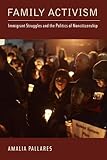Family Activism : Immigrant Struggles and the Politics of Noncitizenship / Amalia Pallares.
Material type: TextSeries: Latinidad: Transnational Cultures in thePublisher: New Brunswick, NJ : Rutgers University Press, [2014]Copyright date: ©2014Description: 1 online resource (192 p.) : 13 photographs, 1 figureContent type:
TextSeries: Latinidad: Transnational Cultures in thePublisher: New Brunswick, NJ : Rutgers University Press, [2014]Copyright date: ©2014Description: 1 online resource (192 p.) : 13 photographs, 1 figureContent type: - 9780813564579
- 9780813564586
- Families -- Political aspects -- United States
- Immigrant families -- Illinois -- Chicago
- Immigrant families -- United States
- Immigrants -- Illinois -- Chicago -- Social conditions
- Immigrants -- United States -- Social conditions
- SOCIAL SCIENCE / General
- immigrant struggles, politics, family activism, family, noncitizenship
- 325.73 23
- JV6456 .P35 2015
- online - DeGruyter
- Issued also in print.
| Item type | Current library | Call number | URL | Status | Notes | Barcode | |
|---|---|---|---|---|---|---|---|
 eBook
eBook
|
Biblioteca "Angelicum" Pont. Univ. S.Tommaso d'Aquino Nuvola online | online - DeGruyter (Browse shelf(Opens below)) | Online access | Not for loan (Accesso limitato) | Accesso per gli utenti autorizzati / Access for authorized users | (dgr)9780813564586 |
Browsing Biblioteca "Angelicum" Pont. Univ. S.Tommaso d'Aquino shelves, Shelving location: Nuvola online Close shelf browser (Hides shelf browser)

|

|

|

|

|

|

|
||
| online - DeGruyter Why Would Anyone Do That? : Lifestyle Sport in the Twenty-First Century / | online - DeGruyter Fantasies of Neglect : Imagining the Urban Child in American Film and Fiction / | online - DeGruyter Wired TV : Laboring Over an Interactive Future / | online - DeGruyter Family Activism : Immigrant Struggles and the Politics of Noncitizenship / | online - DeGruyter Disaster! : Stories of Destruction and Death in Nineteenth-Century New Jersey / | online - DeGruyter Salvadoran Imaginaries : Mediated Identities and Cultures of Consumption / | online - DeGruyter American Hybrid Poetics : Gender, Mass Culture, and Form / |
Frontmatter -- Contents -- Preface -- List of Abbreviations -- Introduction: Immigrant Rights Activism and the Family Paradox -- 1. From Reunification to Separation -- 2. A Tale of Sanctuary: Agency, Representativity, and Motherhood -- 3. Regarding Family: From Local to National Activism -- 4. Our Youth, Our Families: DREAM Act Politics and Neoliberal Nationalism -- Conclusion: Moving Beyond the Boundaries -- Notes -- References -- Index -- About the author
restricted access online access with authorization star
http://purl.org/coar/access_right/c_16ec
During the past ten years, legal and political changes in the United States have dramatically altered the legalization process for millions of undocumented immigrants and their families. Faced with fewer legalization options, immigrants without legal status and their supporters have organized around the concept of the family as a political subject-a political subject with its rights violated by immigration laws. Drawing upon the idea of the "impossible activism" of undocumented immigrants, Amalia Pallares argues that those without legal status defy this "impossible" context by relying on the politicization of the family to challenge justice within contemporary immigration law. The culmination of a seven-year-long ethnography of undocumented immigrants and their families in Chicago, as well as national immigrant politics,Family Activism examines the three ways in which the family has become politically significant: as a political subject, as a frame for immigrant rights activism, and as a symbol of racial subordination and resistance. By analyzing grassroots campaigns, churches and interfaith coalitions, immigrant rights movements, and immigration legislation, Pallares challenges the traditional familial idea, ultimately reframing the family as a site of political struggle and as a basis for mobilization in immigrant communities.
Issued also in print.
Mode of access: Internet via World Wide Web.
In English.
Description based on online resource; title from PDF title page (publisher's Web site, viewed 30. Aug 2021)


